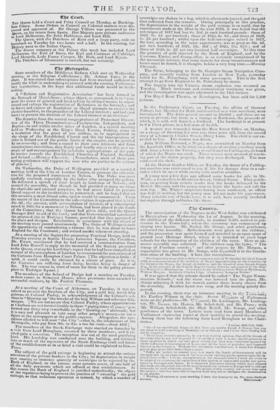At a meeting of the Court of Aldermen, on Tuesday,
it was re- solved to present the freedom of the City, and a gold box worth fifty guineas, to Colonel Pasley, in acknowledgment of the Colonel's ser- vices in " blowing.up "the wrecks of the brig William and schooner Gla- morgan. [We are not aware that Colonel Pasley, whose appointments at Chatham are not inconsiderable in these " piping times of peace," per- formed any thing very remarkable in the " blowing-up " aforesaid; but it is easy and pleasant to vote away other people's money—to cut a figure in the newspapers at the public expense. Altogether, the ope- rations alluded to will cost "the City "—that is, the inhabitants of the Metropolis, who pay from 30s. to 35s. a ton for coals—;about 4404]
The members of the Stock-Exchange were startled on Saturday by avisit from Lord Brougham, escorted by three members ; and it ex- cited quite a sensation. His reception was not of the most gratifying kind. His Lordship was conducted over the building, and initiated into so much of the mysteries of the Stock. Exchange craft and forms ,of the establishment as in so brief a visit could be explained to him.— Times, The subject of the gold coinage is beginning to attract the serious attention of the private bankers in the City; its depreciation in weight now causing an immense quantity of sovereigns to be rejected by the Bank of England, to the extent, some persons assert, of one-half of all the daily payments which are offered at that establishment. In this course the Bank of England is justified undoubtedly; the object of the regulation being to prevent the practice of " sweating " the gold coinage, as that nefarious operation is termed, by which a number of sovereigns are shaken in a bag, which is afterwards burned, and the gold dust collected from the remains. Owing principally to this practice, the depreciation in time weight of the gold coinage is so rapid, that by experiments made at the Mint in the year 1833, it was found that the sovereigns of 1817 had lost Rs. 10d. in each hundred pounds : those of' 1821, 9s. Id, per hundred ; those of 1825, Os. 841., and those of 1829, 6s. 2d. per hundred ; whilst upon the half-sovereigns coined in 1817, the loss, according to the same experiments, was as great as 16s. 4d. per two hundred; of IRA, 13s. 10d. ; of 1825, 13s. 61d. ; and of those of IS29, 6s. 2d. per two hundred lialf.sovereigns. At this time the quantity of gold rejected by the Bank of England, and by the Customs, Excise, and Stampantlice, is so seriously complained of by the mercantile interest, that souse remedy for these inconveniences and losses must be found, it is thought, before a very long time.—Morning Chronicle.
The Sirius, belonging to the St. George's Steam Navigation Com- pany, and recently trading from London to New York, yesterday sailed for St. Petersburg, with many passengers. This is the first attempt to go from England to St. Petersburg by strain.
The inquiry into the Victoria steam explosion was resumed on Tuesday. Much irrelevant and contradictory testimony was given, and the investigation was again adjourned to the 14th instant.
The Royal Kent Theatre, at Kensington, has been sold for 1,100 guineas.


























 Previous page
Previous page